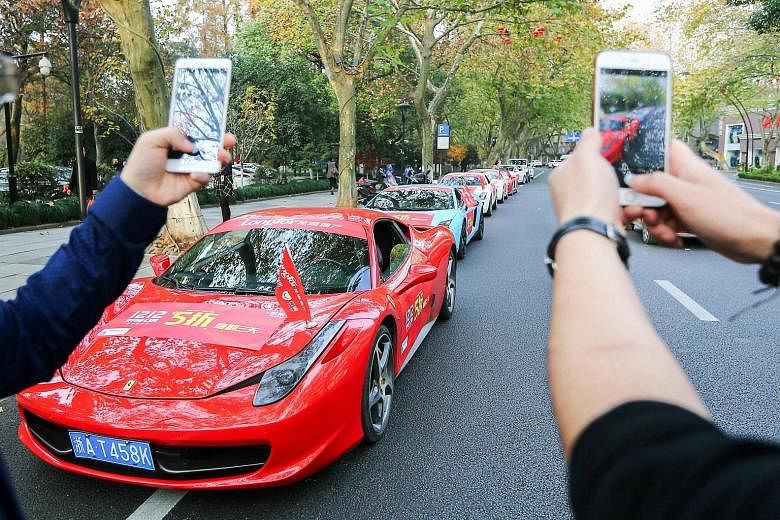Mr Wayne Zhou, 35, sold two of his apartments in Shanghai last year, and has since been transferring the takings totalling about US$1 million (S$1.4 million) out of China.
So far, he has put the money in mutual funds as well as in Hong Kong and US stocks. Recently, he has been looking at buying a property in the west coast of the United States, preferably in the San Diego area.
"I've been sending my money out of the country since several years ago. I feel safer having my money invested overseas," said Mr Zhou, a director at a multinational consumer goods company in Shanghai.
"The market rules in China are not fair. Any day, they (the authorities) could roll out some new rules at midnight, and you can't even get out. But there will always be those who have gotten wind of it earlier and unwound all their investments ahead of everyone else," he added.
With the falling yuan and fears of the Chinese economy tanking, he has stepped up moving his money overseas since last year.
Capital flight, fuelled by people like Mr Zhou and companies seeking to protect the value of their assets, has quickened since last year. In the first 10 months of this year alone, the outflow topped US$530 billion, The Financial Times said.
-
US$146b
China's outbound direct investment hit nearly this amount in the first 10 months of this year, 53 per cent higher than a year earlier, said Beijing's Commerce Ministry. -
US$50k
Chinese residents are allowed to buy up to this amount worth of foreign currencies annually, with the limit resetting at the start of each calendar year.
"I'm more focused on risks, and the property prices in China are already sky-high," he said, adding he is planning on selling his one other investment property soon to quickly channel the funds out of China.
The yuan hit an 8½-year low against the US dollar on Friday, and looks to suffer its worst one- year plunge.
Mr Zhou had previously asked friends and relatives to help him move funds out of the country using their US$50,000-a-year quota.
Chinese residents are allowed to buy up to US$50,000 worth of foreign currencies each calendar year.
He also used trading companies that help people transfer funds overseas for a fee, usually through the use of fake invoices.
One way to do so is to overstate the value of imports into China. A trading company could buy goods, usually from Hong Kong, that are worth US$1 million but pay US$2 million for them. This way, it can transfer an extra US$1 million out of the mainland.
The Chinese authorities have since clamped down on these methods to stem the yuan outflow.
But Mr Zhou would not be deterred. He told The Straits Times he is considering buying gold or the virtual currency bitcoin, which he can buy in China and sell for foreign currencies overseas.
This could also become more difficult, as recent media reports say there are signs that the authorities are curbing gold imports and could start cracking down on bitcoin- related capital outflows.
Though not used by Mr Zhou, many Chinese have used insurance as another means of funnelling their money abroad.
They do this by buying investment-linked policies worth as much as US$1 million in Hong Kong using their UnionPay credit or debit cards. The equivalent amount of yuan will then be deducted from their bank accounts in the mainland. Subsequently, they can cash out the policies and send the money elsewhere.
Earlier this year, the authorities stepped in to outlaw this practice.
Another major driver of the outflow are domestic companies that go overseas to invest in businesses, real estate and even football teams.
China's outbound direct investment hit nearly US$146 billion in the first 10 months of this year, 53 per cent higher than a year earlier, said Beijing's Commerce Ministry.
But to curb capital flight disguised as investments, local media reported late last month the authorities would impose more stringent checks on outbound investments.
These include requiring companies to seek approval for overseas fund transfers of more than US$5 million.
There will also be strict controls on firms' overseas acquisitions above US$1 billion, which are unrelated to their core business.
Analysts expect capital controls to be further tightened given market expectations of more capital outflows and a weakening yuan.
"The People's Bank of China has been trying to defend the currency by spending its foreign reserves," said Mr Gerard Burg, an economist with the National Australia Bank. "The reserves have gone from US$4 trillion in mid-2014 to around US$3 trillion now, which is quite a lot to keep the currency going."
Controlling capital outflow will help ease some of the downward pressure on the yuan, so as to let it depreciate gradually, he said.
Another reason would be to maintain liquidity in China's corporate sector, said Mr Burg.
"The small- and medium-sized companies are highly leveraged, and liquidity is needed to keep businesses going.
"Given changes in the financial sector, where there is increased interbank lending and more connectivity between the banks and the shadow banking sector, more liquidity is also needed," he added.
Economist Li Daokui warned in a recent interview that capital outflows will be one of the key risks for the Chinese economy.
Without question, it will be a key focus for the Chinese economy in 2017, Professor Li of Tsinghua University, told The Securities Times, a paper under the People's Daily.
More capital controls must be implemented, he added.

